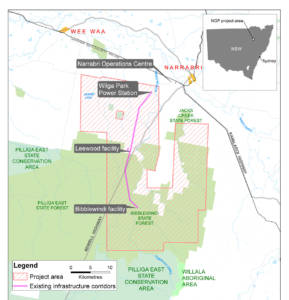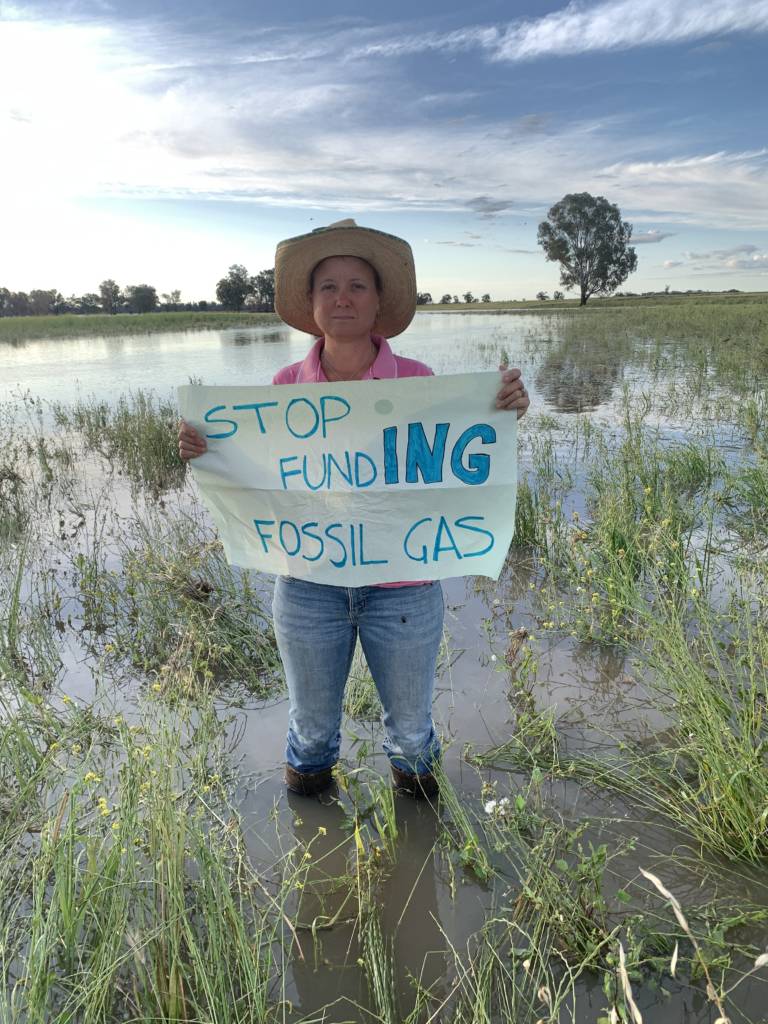Imagine this: a gas producer drills under your house, depletes the water sources and has people chased off their land through the courts. And all the while, without local consultation. That is the reality in which Australian farmers Sally Hunter and Margaret Fleck live. Sally saw the impact that gas extraction by fracking had on her parents’ farm in Queensland: local water sources dried up, what remained was poisoned with chemicals or salinated by the salt released from the soil during fracking. Margaret saw how oil and gas giant Santos tried to build a gas pipeline on her neighbours’ land against their will.
Now that Santos wants to extract gas in their hometown of Narrabri, Sally and Margaret are determined to stop the company from destroying their community and their farmland. That’s why they have got involved with the Lock the Gate Alliance, a network of 260 Australian action groups which oppose harmful gas extraction and coal mining.
What would this area look like if Santos’ plans went ahead?
Sally: “Like living in an industrial area, rather than in one of Australia’s most fertile agricultural regions. The gas that is under the ground here cannot be extracted with one big drilling rig; it has to be done by fracking. This involves injecting enormous quantities of water, sand and chemicals into the ground under high pressure. And Santos wants to frack in many different places. That means drilling rigs everywhere, pipelines, power lines, all kinds of infrastructure to pump and move water, large ponds, and a salt processing plant. And the work area will keep expanding. You saw what happened in Queensland; a huge area was devastated in just a few years.”
Who will be affected by gas extraction around Narrabri?
Margaret: “Santos wants to start fracking in the Pilliga forest. That is a forested area of about 3,000 square metres [that’s bigger than the Greater London area, ed.]. It is not only very important for a lot of animal and plant species, but is also sacred to the original inhabitants of our region, the Gomeroi people. Santos has already built several test stations there – it’s an unpleasant sight. One of Australia’s largest freshwater reserves is under that forest; the majority of people in New South Wales and Queensland depend on it for drinking water, industry and agriculture. Many people are concerned that the water will be polluted with chemicals or salt, and that because of the drilling too much water will leak to lower soil layers.”
Sally: “And not without good reason. In my parents’ neighbourhood, contaminated water from the gas industry has leaked into drinking water. And because so much water is injected into the ground during fracking, more than seven hundred underground water sources in Queensland have already dried up or will dry up within three years, because the water drains away. So it is not just the Gomeroi people and farmers who are threatened by Santos. People in surrounding towns like Narrabri could also start to suffer a lot.”

Map of the intended gas expansion at Narrabri. Bron: Narrabri Gas Project
The droughts and floods in Australia appear regularly in the international news. What issues does your region face?
Margaret: “For me as a livestock farmer, risk management has become an important part of my job – and this is largely related to water. In 2017, 2018 and 2019, it has hardly rained at all. On average, Australian farmers suffer €30,000 in damage from climate change every year.”
Sally: “But after all those dry years, we have actually had far too much rain recently. In fact, much of our own land is currently under water. I can’t go outside without boots on. Neighbouring farmers have already lost half their crops this year. And the roads are not useable, so we are more or less cut off from the outside world. Surely it is absurd that Santos wants to set up another huge new gas project at this time and release all these extra megatons of CO2 and methane into the atmosphere? It is really not acceptable any more: they should really be investing in renewable energy.”
Is there much opposition to Santos’ plans?
Margaret: “Yes and no. Santos has been trying to get this project off the ground for twelve years. In Australia, you have very few rights when it comes to the resources that are under your land. Coal, oil and gas all belong to the state, and Santos has never encountered much opposition from the government. They are allowed to drill up to two hundred metres away from houses, and they are even allowed to drill from that two-hundred-metre limit diagonally under the ground to underneath your house.
“But there is a lot of opposition to a large pipeline that Santos wants to build to pump the gas towards Sydney, and so far the project has always stopped because of that. That pipeline can still be rejected by the landowners. Working with Lock the Gate, I try to meet as many farmers and other landowners as possible, and encourage communities to work together. So far, we have managed to stop the pipeline. There are seven times more people than normal who objected when the government granted the permits, and countless experts are against the project.”
Sally: “In a larger town like Narrabri, opinions are more divided. A few years ago, we went door-to-door for a survey about the pipeline. There were twice as many supporters as opponents, but many of the opponents do not speak out. Santos buys a lot of influence in our community; they promise jobs, they sponsor the library, the football club, even the local newspaper. And they know exactly which councillors to appease. Many people don’t realise that this project will ultimately be bad for the local economy and the community.”
What will the main impacts of development be?
Sally: “Building the infrastructure will require a lot of workers and materials. That will boost employment for a while, but most of the work will be done by people who come from somewhere else and live here temporarily. Afterwards, they will be gone again. And the local companies that supply materials and machinery will also be out of work after that. What’s more, I just worry a lot about the mental health of farmers and landowners who will have to allow gas extraction on their land – and sometimes even under their homes – against their will.”
How do the original inhabitants of Narrabri feel about Santos?
Margaret: “They are completely against gas extraction in the Pilliga forest. Santos offered them a huge amount of compensation, but the Gomeroi people voted that down with the whole community: everyone agreed. We in the farming community could never become so united in opposition; I find it impressive to watch. Santos has now taken the Gomeroi to court to try to take away their rights to the land. It is now waiting for the judge to rule on that, but frankly we are not that optimistic. Usually in such cases, the courts side with the industry and simply evict people from their land. If that were to happen, there is one less hurdle for Santos and one less thing we can do to stop them. But there is another way to stop Santos, and that is through financiers like ING bank.”

Sally is standing on her own – flooded – land with a message to ING: “Stop funding gas!”‘
What would you like to say to ING?
Sally: “I was quite shocked when I heard from the Fossil Free movement that ING is financing Santos. ING operates in Australia and I’ve been a customer for years. It just goes to show how good it is that things like this are made public. ING should finance companies that are committed to renewable energies. We have plenty of sun here… so there are lots of opportunities for solar energy. What we need is investment in technologies that are still in their infancy. For example, energy storage is still a problem.”
Margaret: “And then I would add: invest mainly in local solutions that are supported by the community. For example, large batteries for storing solar energy, owned by the community. Things really can and should be different!”
